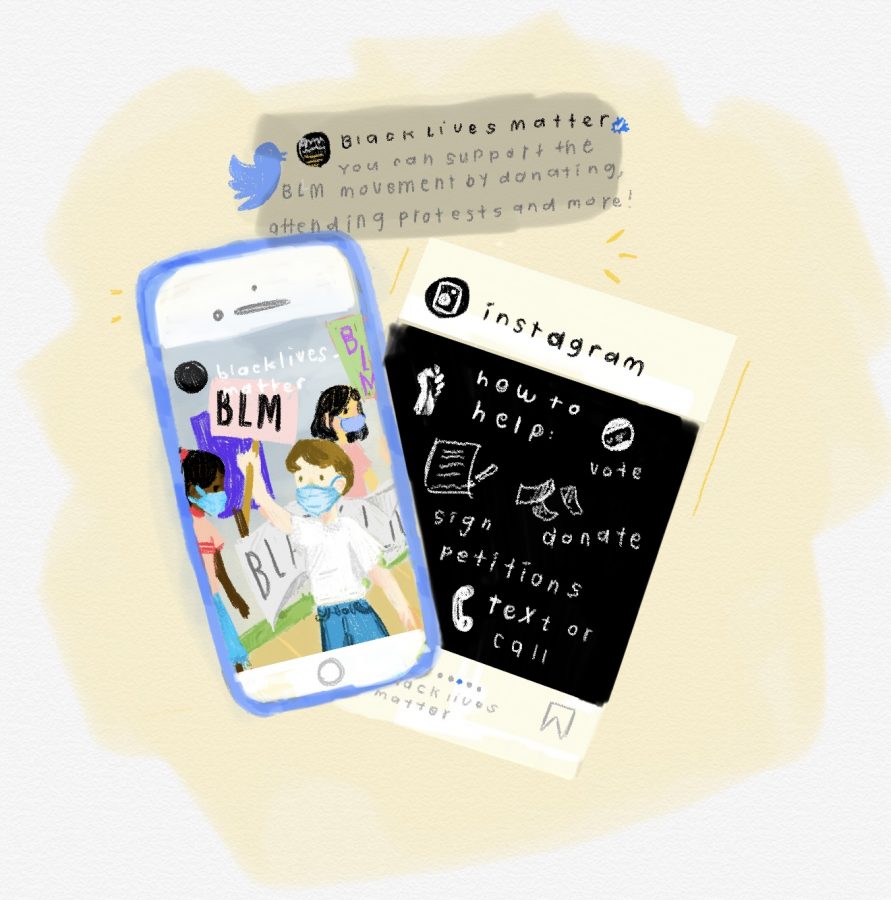Opinion: Generation Z uses social media platforms to be makers of change
September 17, 2020
 From 1995 to 2010, the limitless generation was born. Generation Z, an outspoken and driven group of young people whom I stand with, is at the forefront for change in a time where the world desperately needs it, and we are doing it the way we like it.
From 1995 to 2010, the limitless generation was born. Generation Z, an outspoken and driven group of young people whom I stand with, is at the forefront for change in a time where the world desperately needs it, and we are doing it the way we like it.
Being brought up in a technologically savvy and advanced world, the post-millennial group has become connoisseurs of social media, sharing their voices with thousands of people, all through the simple act of posting information on the issues that are prevalent today.
Millennials, Generation X, and Baby Boomers didn’t grow up seeing cars drive themselves, food being delivered through an app or millions of songs stored on one phone. In order to reach a wide array of people, the past generations had to create in-depth strategies, whereas Gen Z can just write a Tweet. Think about the leaders of the past: Martin Luther King Jr., the suffragettes, or Gandhi. Imagine if they had been a part of Gen Z, utilizing the vast amount of social, economic, and technological resources available to them. Their audience and message would’ve spread in seconds.
So what does this tell us about the opportunities that Gen Z has? We, the technologically savvy group that we are, can put our passions into action. Online platforms, including Instagram and Youtube, offer a place for young people to speak up about issues that we care about.
From the time we all made a social media page, we have become accustomed to scrolling through feeds and websites that are based on our interests. Social media activists are taking what we already know as our daily routines on social media, and implementing useful information and ideas to flow through our feeds, raising awareness for global issues.
The algorithms that calculate what we click on, like, share, and post, create an evolving social media page that correlates to our personal interests. This, in turn, establishes a community where alike people can spread awareness, learn from a new post, and quickly start trends that can lead to a greater sense of understanding on a certain issue.
Instead of watching a funny video, young people have begun to show the fires burning in California. Instead of liking their friends’ pictures, young people are sharing information on how to donate to Breonna Taylor. And instead of simply posting resources on their page, young people are encouraging the world to be the makers of change beyond their computer screens.
And while we are not a completely monolithic group, some being social media hermits, and others having a large presence online, we all have the ability to use our platforms for good, whether someone’s Instagram page has 100 followers or 500,000.
According to the Irregular Labs Survey, who surveyed 300 Gen Z-ers, 75% of Gen Z thinks that being politically or socially engaged is important to their identity. In addition, 68% said they informed themselves about social and political issues through social media channels.
This desire to create, share, and change on social media allows our voices to be heard louder than ever before. And as we wake up to more headlines of disaster—the spread of the coronavirus, racism, wildfires, shootings, climate crises, and other global emergencies—instead of keeping quiet, we feel empowered to take action.
Take Greta Thunberg, for example. A 15-year-old who took a stance on climate change at various rallies in Stockholm, London, Helsinki, etc., shared the direct impact that this issue has on her and her generation. Through sharing her message online, this young student was able to rally a large group of young activists behind her to spread awareness about the dangers of global warming, leading school strikes to take place across the world.
Another revolutionary of social media activism is Muhammad Najeem. His Twitter and Instagram profiles are filled with selfies, just like any other teenager. But in the background, he captures the disastrous effects that war has had on his town in Eastern Ghouta, and the rest of Syria. Najeem’s goal is to be a voice for the thousands of people who have died in his hometown, raising awareness to his 21,000 follower fanbase on how they can help and where to do it.
This surge in social media activism is seen now more than ever after 17-year-old Darnella Frazier captured the brutal killing of George Floyd. This video caught onto various social media platforms just minutes after being posted and catalyzed a mass movement for systematic change within our police departments. The social networking app, Yubo, partnered with Business Insider to poll students and young adults on prevalent issues that included the Black Lives Matter movements and their overall support for it. The study found that 88% of respondents think that African Americans are treated differently in this country and, with no surprise, 78% of those have taken their support to various social media platforms.
The issues that Thunberg, Najeem, Frazier, and the rest of Generation Z stand for might not have gained as much of a following in the past; but because we have social media networks such as Instagram, Twitter, Snapchat, and Tik Tok to use to our advantage, these global problems are being pushed to the forefront.
Instead of accepting slow, systematic change, Generation Z can begin to tackle issues at their core through social media and reach audiences beyond our local communities. This, to me, should instill a sense of power and courage within our generation. We have the ability to create, learn, try, fail, and publish, all through a click of a button on our computer screens. So, why should we limit ourselves to keeping our voices contained?
We truly have the power to change the world in a way that will have lasting impacts for the generations to come. By using our voices that can echo across the world, Generation Z can claim the title of the limitless generation.



